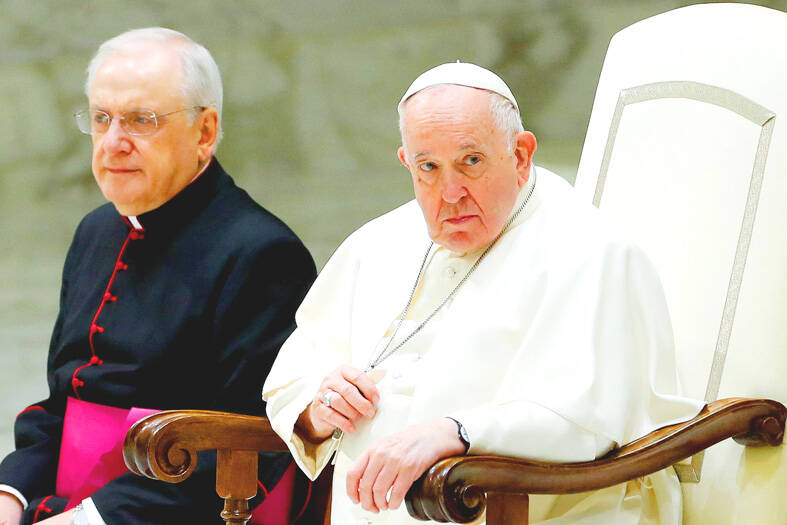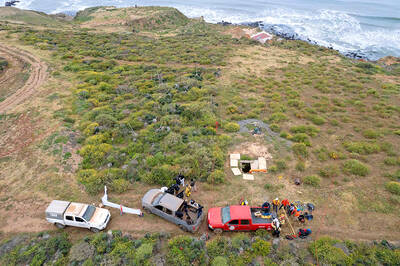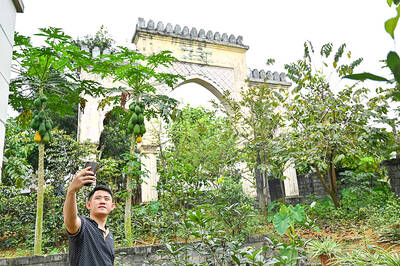From his reforms to his foreign relations, criticism of Pope Francis has intensified since the death of his predecessor, Benedict XVI, revealing a climate of “civil war” at a time when the Catholic Church is engaged in a global conversation about its future.
Benedict, a conservative German theologian who was pope for eight years before resigning in 2013, died on Dec. 31 at the age of 95.
Within days of his death, his closest aide, Georg Gaenswein, revealed Benedict’s concerns at some of the changes made by Pope Francis, notably his decision to restrict the use of the Latin Mass.

Photo: Reuters
Many in the conservative wing of the Roman Curia, which governs the Church, have long complained the Argentine pontiff is too focused on pastoral matters at the expense of theological rigor.
After death last month of Australian cardinal George Pell, it was revealed that he had authored an anonymous note published last year that directly attacked Francis.
The note described the current papacy as a “catastrophe,” and among other issues criticized “heavy failures” of Vatican diplomacy under his watch.
Pell, once a close adviser to Francis, was jailed for child sexual abuse before being acquitted in 2020.
At the end of last month, German Cardinal Gerhard Mueller published a book adding fuel to the fire.
The former head of the Vatican’s powerful congregation for the doctrine of the faith denounced Francis’ “doctrinal confusion” and criticized the influence of a “magic circle” around him.
Mueller’s book caused consternation among some inside the Vatican.
“When you accept a cardinal’s cap, you agree to support and help the pope. Criticisms are made in private, not in public,” a senior official in the Secretariat of State said.
Pope Francis told reporters on his plane returning from South Sudan on Sunday last week that his critics have “exploited” Benedict’s death to further their cause.
“Those who exploit such a good person, such a man of God ... I would say they are unethical people, they are people belonging to a party, not to the Church,” he said.
Italian Vatican expert Marco Politi said Mueller’s book “is a new stage in the unstoppable escalation by the pope’s adversaries.”
“There is a civil war in the heart of the church, which will continue until the last day of the papacy,” he said.
The tensions come as the Catholic Church conducts a vast global consultation on its future, the Synod on Synodality, launched by Pope Francis in 2021.
Designed to decentralize the governance of the church, it has revealed key differences, with the German Catholic Church, for example, showing distinctly more appetite for reform than Rome.
Discussions cover several areas, from the place of women in the church to how to handle child abuse scandals, from whether priests should marry to how the Church welcomes LGBTQ people.
Politi said that critics of Pope Francis are already converging into a “current of thought capable of influencing the next conclave,” and by extension the next papacy.
A conclave, a global gathering of cardinals, would be called if Francis died or resigned.
The pope has said he would be willing to follow Benedict’s example and resign if his health stopped him from doing his job.
Despite knee problems that have seen him use a wheelchair in recent months, Francis remains active and in charge, and popular around the world, as the crowds during his recent trip to Africa showed.
“This knee is annoying, but I go on, slowly, and we’ll see,” the 86-year-old said on Sunday last week.

With the midday sun blazing, an experimental orange and white F-16 fighter jet launched with a familiar roar that is a hallmark of US airpower, but the aerial combat that followed was unlike any other: This F-16 was controlled by artificial intelligence (AI), not a human pilot, and riding in the front seat was US Secretary of the Air Force Frank Kendall. AI marks one of the biggest advances in military aviation since the introduction of stealth in the early 1990s, and the US Air Force has aggressively leaned in. Even though the technology is not fully developed, the service is planning

INTERNATIONAL PROBE: Australian and US authorities were helping coordinate the investigation of the case, which follows the 2015 murder of Australian surfers in Mexico Three bodies were found in Mexico’s Baja California state, the FBI said on Friday, days after two Australians and an American went missing during a surfing trip in an area hit by cartel violence. Authorities used a pulley system to hoist what appeared to be lifeless bodies covered in mud from a shaft on a cliff high above the Pacific. “We confirm there were three individuals found deceased in Santo Tomas, Baja California,” a statement from the FBI’s office in San Diego, California, said without providing the identities of the victims. Australian brothers Jake and Callum Robinson and their American friend Jack Carter

Le Tuan Binh keeps his Moroccan soldier father’s tombstone at his village home north of Hanoi, a treasured reminder of a man whose community in Vietnam has been largely forgotten. Mzid Ben Ali, or “Mohammed” as Binh calls him, was one of tens of thousands of North Africans who served in the French army as it battled to maintain its colonial rule of Indochina. He fought for France against the Viet Minh independence movement in the 1950s, before leaving the military — as either a defector or a captive — and making a life for himself in Vietnam. “It’s very emotional for me,”

UNDER INVESTIGATION: Members of the local Muslim community had raised concerns with the police about the boy, who officials said might have been radicalized online A 16-year-old boy armed with a knife was shot dead by police after he stabbed a man in the Australian west coast city of Perth, officials said yesterday. The incident occurred in the parking lot of a hardware store in suburban Willetton on Saturday night. The teen attacked the man and then rushed at police officers before he was shot, Western Australian Premier Roger Cook told reporters. “There are indications he had been radicalized online,” Cook told a news conference, adding that it appeared he acted alone. A man in his 30s was found at the scene with a stab wound to his back.